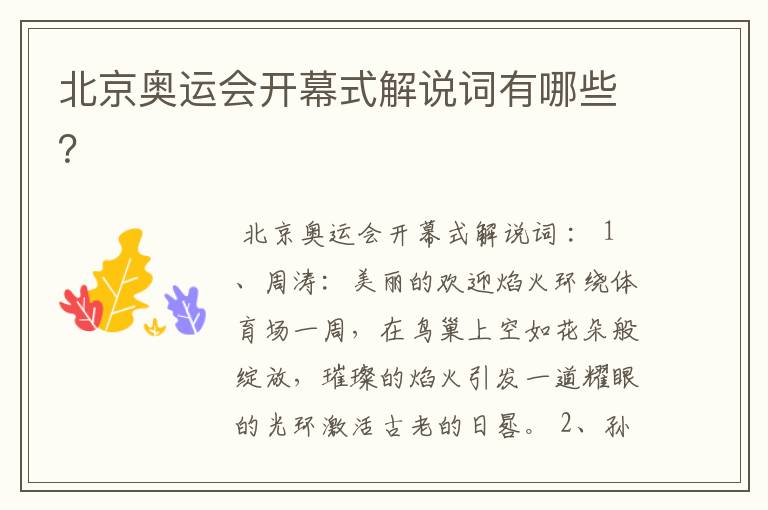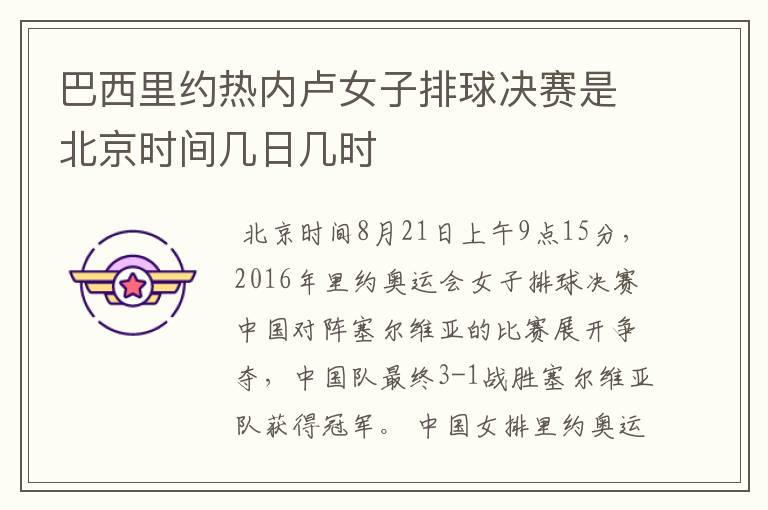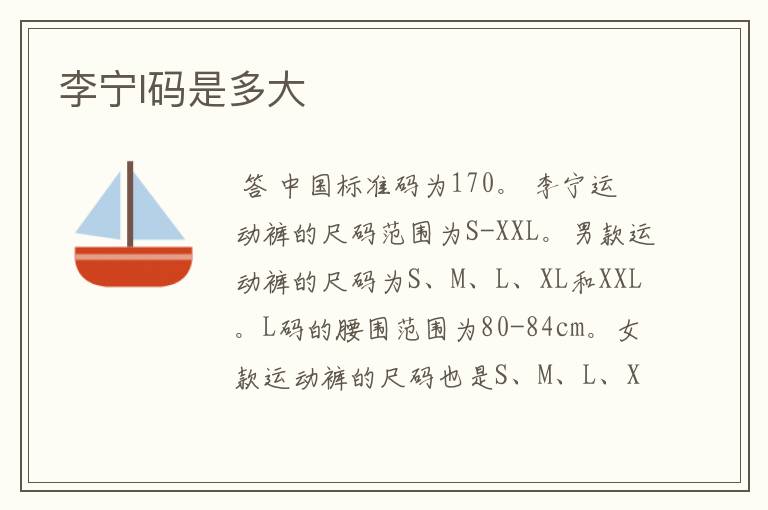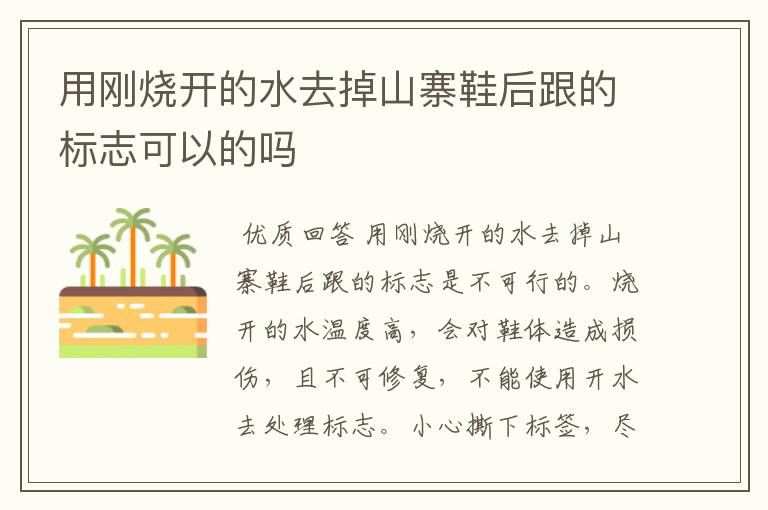奥运会开幕式解说词
今天运困体育就给我们广大朋友来聊聊奥运会开幕式,希望能帮助到您找到想要的答案。
北京奥运会开幕式解说词有哪些?

北京奥运会开幕式解说词:
1、周涛:美丽的欢迎焰火环绕体育场一周,在鸟巢上空如花朵般绽放,璀璨的焰火引发一道耀眼的光环激活古老的日晷。
2、孙正平:现在大家看到的在鸟巢上空出现的图案是我国古代利用太阳投射的影子来测定时间的记时仪器日晷。
3、周涛:此刻由日晷发出的时间之光点亮了鸟巢,点亮了由2008面缶和2008个击缶者组成的巨型缶阵。
4、孙正平:早在夏商时代,就有了击缶的演奏。
5、周涛:此刻,缶面上的灯光和着有节奏的击打依次亮起。整齐而震撼的声音以光波的律动向我们传递光阴的概念。
6、孙正平:和着如鼓般的击打声,场上出现了巨大的光影数字。每一次怦然心动的声响,每一次光影数字的更迭,都预示着北京奥运的分秒临近。
7、周涛:就让我们穿越时空,一同倒数,让震撼的节奏,激荡千年祖国的万里长城疆土,激荡中华民族的奔腾血脉,共同迎接中国的奥运时间光耀莅临!
8、周涛:夜空璀灿,缶声震天。颂歌飞扬,情谊无边。接下来我们将会看到一场独具中国古典艺术魅力的欢迎仪式,欢迎所有远道而来的朋友。
9、孙正平:中国素以文明古国,礼仪之邦著称于世。几千年来,不仅创造了灿烂悠久的历史文化,更形成了高尚的道德品格和完整的礼仪规范。
10、周涛:此刻,两千零八名乐手,一边击缶,一边高声吟诵着五千年前孔子写在论语中的名句。我们用这种独特的方式,表达北京最真挚的欢迎之情。
11、孙正平:欢迎所有热爱友谊与和平的朋友们来到北京,来到中国!欢迎所有热爱奥林匹克的朋友们来到奥林匹克大家庭!
“北京冬奥会开幕解说词”金句值得摘抄
北京冬奥会开幕解说词金句,值得摘抄
01迢迢冬奥路,殷股体育情。
02相知无远近,万里尚为邻。
03鸟巢流光溢彩,火炬耀亮长空
04迎接冰雪之约,奔向美好未来。
05天上春来谁报人,江山气象一时新。
06立春,冬奥开幕日;虎年,虎虎有生机。
07国歌声中,国旗徐徐升起,迎风猎猎飘扬。
08一簇微火,烛照天地 。冰雪之约,向世界展开全新的画卷
09冰面如镜,映照大千。世界的目光,投向这晶莹剔透的舞台
10“燕山雪花大如席。古人的浪漫与想象,穿越时空映照古
11焰火腾空而起,随即幻化为漫天流星,传扬美好的期待和希望。
12漫天雪花,飘飘洒洒。每一朵雪花,都在讲述一个冰雪故事
13奥林匹克的日子。风也很和谐,该生动的,一夜间全成为生动。
14世界上没有两片一样的雪花。每一朵雪花,都映射出独特的光华。
15灯火里的中国,温馨和谐,流光溢彩;新时代的中国,长歌豪迈,生机勃勃。
16冰雪五环,破冰而出。破冰寓意着打破隔阂,互相走近,大家融为一体。
17“鸟巢”上空火树银花,中国人正用自己的方式表达对全世界来宾的欢迎。
18一扇“中国窗”铺展开来,“窗外”明月在天,美景历历大好河山,尽收眼底。
19各美其美,美美与共。场地中央,升起一座巨大的雪花台与雪花光影重合。
20银装素裹,江山神圣,这是我们期待的冬天的灿烂,以及我们呼唤奥林匹亚之神时的诗情
21北京冬奥会的主题口号是:发出的携手共创未来的新时代之音。
22让开幕式飞满雪花与和平鸽圣洁的翅膀吧,让闪动的翅膀,成为全世界观众的闪动的睫毛吧
23世界期待中国,中国做好了准备,我们即将兑现承诺向全世界呈现一届简约、安全、精彩的奥运盛会
24“世界大同,天下一家。”这一刻,全世界人民打破隔阂、摒弃偏见,在五环的光辉下“一起向未来
25近七年时光倏忽而过,中国的奥运冰雪路,走得步履坚定。回望来路,初心未泯;冀望未来,大道宽广。
26漫步在古街上,冬奥元素随处可见,“冰墩墩”和“雪容融”的雕塑时而展示憨态可掬的可爱形象,时而拿起冰球棍展示飒爽英姿
27一座北京城,两圆奥运梦,三区晴雪盼,四面八方朋五环聚健儿六祝赛功成,七项激战酣,八方捷报声,九门同期盼,十方和平钟。
28这一刻,东方和西方,中国和世界,我们 、你们和他们,一起凝视着,一起见证着,一页新的历史诞生:北京成为世界上首座“双奥之城”
29那欢迎四海宾朋、遥望冰雪五环的“中国门”那遍览壮阔山河、展示中华之美的“中国窗那祝福吉祥如意、传递友爱和平的“中国结
30一滴冰蓝色的水墨从天而降,幻化为黄河之水,倾泻而下。翻腾的浪涛,最终凝结为一片晶莹剔透的冰雪天地。一方巨大的水从冰面中升起,凝固成冰。
31成功举办北京冬奥会、冬残奥会将增强我们实现中华民族伟大复兴的信心,见证我们致力于推动构建人类命运共同体,展示新时代中国阳光、富强、开放的良好形象。
32我国是一个多民族国家,5000年来各民族共同创造了悠久的中国历史,灿烂的中华文化,铸就起了共同的精神家园,各民族兄弟姐妹在此欢聚一堂欢歌热舞喜迎冬奥。
33密叶因裁吐,新花逐翦舒。柔嫩的鲜绿在洁白的冰面上摇曳,春的勃勃生机在翠的编织中直冲云霄,焰火“立春”绽放在国家体育场鸟巢”的夜空,照亮每一个人的面庞。
34奥林匹克的使命是让人们在和平竞争中团结一心。奥运会总是搭建沟通的桥梁,绝不会筑起一道道高墙。奥运会让我们保留多样性的同时,把我们团结在一起。
35朝气蓬勃的青少年用他们独有的青春活力让这个冰雪世界变得更加生机盎然。激情的雪花渐渐点燃了他们心中的梦想,他们在学习中不断成长,让梦想绽放出五彩斑斓的光芒
36这是一个突破传统大胆创新而又别出心裁的设计,在这一刻没有点燃的动作,没有火烟台的熊熊燃烧,但留下了一棒棒火炬接续传承的微火。微火虽微,永恒绵长,生生不息。
37北京冬奥会必将是一届载入史册的奥运会,北京冬奥会的开幕式必将是一场开创冬奥会历史的盛典。北京冬奥会的冬奥之火就是一捧光明永驻,直入人心,连接你我,一起向未来的奥林匹克之火。
38从梦想初萌到“双奥之城”,从张大眼睛打量世界到相约“一起向未来”,从冬奥赛场的荣耀时刻到“带动三亿人参与冰雪运动”的广阔场景,中国与奥林匹克一路同行,一路播撒希望和奋斗的种子
39在鸟巢现场,同样是热闹欢腾,激情的桑巴舞步点燃了全场的热情,在寒冷的冬夜将生命的热烈在冰雪的世界尽情释放,我们拥有着同一个世界,我们拥有同一个梦想,我们踏着同一个节奏寻觅爱的曙光。
40从2008年的“同一个世界,同一个梦想”到2022年的“一起向未来”,中国积极参与奥林匹克运动,坚持不懈弘扬奥林匹克精神是奥林匹克理想的坚定追求者、行动派。世界期待中国,中国做好了准备。
奥运会开幕式解说语言有哪些?
2022年冬季奥运会三种语言解说分别是法语、英语和汉语。奥运会开幕播报的顺序是法语、英语和主办国语言。
因为最先提议创办奥运会的是法国人顾拜旦,而且国际奥委最初就是在巴黎索邦大学成立起来的,法语顺理成章成为奥运会第一官方语言,所以,在奥运会的正式场合,法语都是最先播报的,然后用英语重复,最后是主办国官方语言。
北京2022年冬奥申委官方网站正式开通,这也是北京联合张家口申办冬奥会的一项重要工作,冬奥申委官网提供中、英、法三种语言的内容,设8个栏目。
北京奥运会开幕式解说词:
1、周涛:美丽的欢迎焰火环绕体育场一周,在鸟巢上空如花朵般绽放,璀璨的焰火引发一道耀眼的光环激活古老的日晷。
2、孙正平:现在大家看到的在鸟巢上空出现的图案是我国古代利用太阳投射的影子来测定时间的记时仪器日晷。
3、周涛:此刻由日晷发出的时间之光点亮了鸟巢,点亮了由2008面缶和2008个击缶者组成的巨型缶阵。
4、孙正平:早在夏商时代,就有了击缶的演奏。
5、周涛:此刻,缶面上的灯光和着有节奏的击打依次亮起。整齐而震撼的声音以光波的律动向我们传递光阴的概念。
6、孙正平:和着如鼓般的击打声,场上出现了巨大的光影数字。每一次怦然心动的声响,每一次光影数字的更迭,都预示着北京奥运的分秒临近。
求北京奥运会开幕式英文解说词
BBC直播北京奥运会开幕式解说词
Sue Barker: Good afternoon. In case you are wondering that how important the Olympic Games are and that what it means to the athletes then those three “wise men” should know since they have been to twelve Olympic Games between them. So let’s say we are here in Beijing and we are now in this magnificent ninety-one thousand seats stadium. It’s the national stadium; it’s affectionately known as “the Bird’s Nest”. We are preparing for what is promised to be, a truly spectacular opening ceremony. It won’t start though until 8 o’clock as promised, 8 o’clock local time on the 8th day of the 8th month, 2008. So you won’t miss a thing.
But now for many years have sport and politics had such an uneasy unbalance. There has been political conflict; there have been international protest and environmental fears. As well, there has been so much debate since the People’s Republic of China and Beijing were awarded the games back in 2001. Huw, the world is watching China around Beijing, can you put these games into political contexts for us please
Huw Edwards: Well, Sue, this is quite something. This is basically China saying to the world: we arrived; we are a 21st-century super power; we can do the best Olympics ever. They spent 40 billion dollars on these games. Nothing can go wrong as far as they are concerned.
Sue Barker: Carrie, Can you tell us what the Games means to people in China
Carrie Gracie: Well, as far as I can see, people here are really not exposed to the negative messages we have been talking about: the protest, the environment worries, the heavy-handed security. Most people are proud. They are ready to party after seven years of getting ready.
Sue Barker: There are other issues involved here, Michael. For example, President Bush is here for the Opening Ceremony tonight. For the first time the American president is on the foreign soil for opening ceremony. What has been the reaction to that back home in the United States
Michael Johnson (4-time Olympic champion (1992-2000)): I don’t think many people are really so surprised that he decided to come here, and I think his decision is less political. I think he probably made the personal decision that he wanted to take advantage of the opportunity to come here, to see this and to be a part of the ceremony, regardless of anyone thinks back at home.
Huw Edwards: This is how the Games of the 29th Olympiad are beginning. 2008 drummers are beating the count-down in a way that has never been before. The drummers themselves are producing remarkable electrifying effect.
Sue Barker: These are the full drums calling up the ancestor 4000 years old, 2008 of them.
Huw Edwards: They are waiting for the signal, for the final count-down that Beijing has been waiting for seven years. A minute to go.
Huw Edwards: The Bird’s Nest stadium is filled by energy of these drummers with the very precise message carried.
Sue Barker: Yes. The message is from Confucius saying two and half thousand years old. “Friends come from the far. How happy we are!”
Huw Edwards: This is the bird’s-eye view across the centre of Beijing. The fireworks are creating burning footprints all the way from the Tian’anmen Square, up the central axis, to the Olympic Green and the neo National Stadium.
Sue Barker: So much resonance to the imperial China here. The Confucius, who of course was taboo during the years of the revolution, now is back in style. So are these imperial accesses right through the Forbidden City, and all the identifying marks of five thousand years of the united imperial history.
Huw Edwards: There will be twenty thousand fireworks used for doing this opening ceremony, and the dust creates the Olympic rings. Five rings represent the five continents, the symbol of Olympic unity, unity of mankind in sport.
Sue Barker: You can see the performers suspended, floating through the air and coming down from the huge wires attached to the roof of this stadium. What is worth mentioning is this is a kind of 21st-century take-on of Buddhist figures you find on the walls of caves of Dunhuang. This is the reference to China’s huge northwestern Tang Dynasty spread of the Silk Road.
Huw Edwards: The rings, which are magically made of dust, now somehow raise in this stadium, indicating the arrival of the Olympics in China.
Carrie Gracie: The genius behind this very original opening ceremony, Zhang Yimou, is very much back in now. In a way, he is the story of contemporary China. He told us the other day that he wanted this ceremony to say to the world: romance, family.
Huw Edwards: What he also says is that China is very proud of its 5000 years of civilization. It is not afraid to modernize.
(After the raising of Chinese national flag)
Another spectacular display of fireworks, not just over the Olympic Stadium but over the city. The red flag flutters inside the national stadium. Is the red flag saying something about Chinese history as well, Carrie
Carrie Gracie: Well, yes, because that’s about what all we are going to say about Chinese Communism in this opening ceremony. The five stars on the flag signify the unity of the country and the leadership of Chinese Communist Party. But we are going to say about a lot more of this kind of images, the traditional, the calligraphy, the culture, the sophistication of ancient China.
Huw Edwards: Indeed. What’s now going to happen is that we are going to enjoy different phases of Chinese history, different aspects of Chinese culture, some of them quieter, some of them on a very big scale.
Very clever is the way they led us from the little film introducing the theme of the scroll to this actual scroll, which is on the floor of this arena. It measures at least 25 meters in width and the length covers the entire length of the arena itself, so believe me, it is big. And this would be the canvas on which lot of tableaus will be painted.
Carrie Gracie: We are going to say that the wash painting developed in China during the Tang Dynasty. To begin, artist puts a few drops of water on ink stone, grinds the ink in circular motion, and then paints with a brush made of wolf hair or horse hair.
Huw Edwards: While the painting goes on, the stream of cultural icons of Chinese historical progress flows on the painting scroll itself. Very cleverly done.
Carrie Gracie: This is the Guchin, the ancient seven-stringed instrument we hear at the same time. We are going to see many of Chinese instruments during the course of this opening ceremony, and this is one of the most harmonious to Chinese ear. And the whole theme of this ceremony is harmony.
Huw Edwards: The Guchin, as Chinese say, has a history of three thousand years, and they claim it is the oldest pluck instrument in the world. I’m sure there will be other views on that, but this is the claim being made.
Carrie Gracie: These are ‘the three thousand disciples’ of Confucius, whether he really had three thousand, no matter, but certainly he does in this performance. What they chant is “All those within four seas can be considered as brothers” from The Analects, Confucius’s most famous work.
Huw Edwards: They are holding bamboo slips, a kind of books with scripts carved on the stringed bamboo slices. Again, the energy created by these men inside this stadium is remarkable.
The three thousand disciples of Confucius are celebrating learning, celebrating Chinese philosophy, and that learning of course takes the forms of books and paper, and of what we are going to see – the printed words.
Carrie Gracie: Confucius had the habit of speaking truth to the power when in and out of favor. – Here we have the example of the first movable type system, which was created here in China, out of ceramic blocks, around 1041 A.D. It was in 1450s for Europe to introduce what generally regarded as the independent invention of moveable type, and that was created by Germany’s Johannes Gutenberg.
We see here the evolution of one character, one special character which holds the clues to everything else this evening. This character is “he”, and it means harmony.
Moveable type began in the Sui Dynasty in the sixth century. Bi Sheng, in the Song Dynasty, improved the matter by making clay types and print. Every Chinese school child is told that the movable type is one of the greatest inventions of ancient Chinese civilization, along with the gun powder, the paper, and the compass. There is the modern character “he”, the one that you will see written in China today.
Huw Edwards: Peach blossoms, romantic and enjoyable, demonstrating the sweetness, peace and love in Chinese people.
2008北京奥运会开幕式美国NBC电视台
专题解说词
The footprints in their history stretch back 5000 years,
but for the world's greatest wall builders,
makers of a forbidden city,
what happens tonight is not merely a small step,
but a great leap.
China is welcoming the world.
Who will they be when this is over
The clock of their lives has been beating with a screaming urgency.
They have pushed themselves to be as sharp as a razor's edge,
for this summer,
to be here,
now,
and nowhere else.
Beijing, the first ever Olympics for the world's most populous nation,
1.3 billion who framed the front-page story of the 21st century,
a China both outside time
and bursting every which way in a bewildering rush of transformation.
They have made themselves anew,
relentlessly,
devotedly,
so they might, on these days (if you want)
step into history.
They've submitted to an uncompromising search for mastery,
repetitive motion, technique polished toward an impossible(guys) ideal.
fall
fail
get up.
It's not the triumph,but the struggle.
It's not the triumph,but the struggle.
It's not the triumph, but the struggle.
Not the triumph,but the struggle.
Why did they begin
Why do they endure
It is time for the colorful clash of a universe of shimmering, still to be written biographies.
It is time to chase eternal youth.
Time to defy public heartbreak, laws of gravity.
Time for a Jamaican lightening bolt,
California brilliance.
It is time for the sweetly engaging gymnast from West des Moines,
and the poised daughter of a decorated Olympian.
It is time for the one who has endured the grinding burden of mind-blowing expectations.
Time for the headliner of the Athens games to play superman all over.
Are we about to see the fastest race ever
A dynasty confirmed
A victory cheered by a billion voices
They have pushed themselves to be as sharp as a razor's edge,
for the scintillating prospect of enduring accomplishments,
to leave these games as the greatest Olympic champion of all time.
They have made themselves anew,
for this summer,
for Beijing,
for this
NOW !
今天的内容先分享到这里了,读完本文《奥运会开幕式解说词》之后,是否是您想找的答案呢?想要了解更多,敬请关注www.zuqiumeng.cn,您的关注是给小编最大的鼓励。
本文来自网络,不代表本站立场,转载请注明出处:https://www.zuqiumeng.cn/wenda/1723114.html




